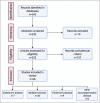Coronavirus disease 2019 and neurodegenerative disease: what will the future bring?
- PMID: 33395100
- PMCID: PMC7924921
- DOI: 10.1097/YCO.0000000000000688
Coronavirus disease 2019 and neurodegenerative disease: what will the future bring?
Abstract
Purpose of review: Over 70 million people worldwide, including those with neurodegenerative disease (NDD), have been diagnosed with coronavirus disease 2019 (COVID-19) to date. We review outcomes in patients with NDD and COVID-19 and discuss the hypothesis that due to putative commonalities of neuropathogenesis, COVID-19 may unmask or trigger NDD in vulnerable individuals.
Recent findings: Based on a systematic review of published literature, patients with NDD, including dementia, Parkinson's disease, and multiple sclerosis (MS) make up a significant portion of hospitalized COVID-19 patients. Such patients are likely to present with altered mental status or worsening of their preexisting neurological symptoms. Patients with NDD and poor outcomes often have high-risk comorbid conditions, including advanced age, hypertension, diabetes, obesity, and heart/lung disease. Patients with dementia including Alzheimer's disease are at higher risk for hospitalization and death, whereas those with preexisting Parkinson's disease are not. MS patients have good outcomes and disease modifying therapies do not increase the risk for severe disease. Viral infections and attendant neuroinflammation have been associated with the pathogenesis of Alzheimer's disease, Parkinson's disease, and MS, suggesting that COVID-19 may have the potential to incite or accelerate neurodegeneration.
Summary: Since patients with Alzheimer's disease are at higher risk for hospitalization and death in the setting of COVID-19, additional precautions and protective measures should be put in place to prevent infections and optimize management of comorbidities in this vulnerable population. Further studies are needed to determine whether COVID-19 may lead to an increased risk of developing NDD in susceptible individuals.
Copyright © 2020 Wolters Kluwer Health, Inc. All rights reserved.
Conflict of interest statement
There are no conflicts of interest.
Figures
Similar articles
-
Dementia is an age-independent risk factor for severity and death in COVID-19 inpatients.Alzheimers Dement. 2021 Nov;17(11):1818-1831. doi: 10.1002/alz.12352. Epub 2021 Apr 21. Alzheimers Dement. 2021. PMID: 33881211 Free PMC article.
-
Impact of COVID‑19 infection in patients with neurodegenerative diseases with particular focus on Alzheimer's and Parkinson's disease.Acta Neurobiol Exp (Wars). 2022;82(4):424-432. doi: 10.55782/ane-2022-040. Acta Neurobiol Exp (Wars). 2022. PMID: 36748965
-
Exploring the Paradox of COVID-19 in Neurological Complications with Emphasis on Parkinson's and Alzheimer's Disease.Oxid Med Cell Longev. 2022 Aug 31;2022:3012778. doi: 10.1155/2022/3012778. eCollection 2022. Oxid Med Cell Longev. 2022. PMID: 36092161 Free PMC article. Review.
-
Parkinson's disease may worsen outcomes from coronavirus disease 2019 (COVID-19) pneumonia in hospitalized patients: A systematic review, meta-analysis, and meta-regression.Parkinsonism Relat Disord. 2021 Jun;87:155-161. doi: 10.1016/j.parkreldis.2021.04.019. Epub 2021 Apr 24. Parkinsonism Relat Disord. 2021. PMID: 33931304 Free PMC article.
-
Dementia and Parkinson's Disease: Risk Factors for 30-Day Mortality in Nursing Home Residents with COVID-19.J Alzheimers Dis. 2021;84(3):1173-1181. doi: 10.3233/JAD-210319. J Alzheimers Dis. 2021. PMID: 34542068 Free PMC article.
Cited by
-
Detection of blood-brain barrier disruption in brains of patients with COVID-19, but no evidence of brain penetration by SARS-CoV-2.Acta Neuropathol. 2023 Nov;146(5):771-775. doi: 10.1007/s00401-023-02624-7. Epub 2023 Aug 25. Acta Neuropathol. 2023. PMID: 37624381 Free PMC article. No abstract available.
-
Neurological Complications of COVID-19: Underlying Mechanisms and Management.Int J Mol Sci. 2021 Apr 15;22(8):4081. doi: 10.3390/ijms22084081. Int J Mol Sci. 2021. PMID: 33920904 Free PMC article. Review.
-
Can SARS-CoV-2 Infection Lead to Neurodegeneration and Parkinson's Disease?Brain Sci. 2021 Dec 18;11(12):1654. doi: 10.3390/brainsci11121654. Brain Sci. 2021. PMID: 34942956 Free PMC article. Review.
-
SARS-CoV-2 and neurodegenerative diseases: what we know and what we don't.J Neural Transm (Vienna). 2022 Sep;129(9):1155-1167. doi: 10.1007/s00702-022-02500-w. Epub 2022 Apr 17. J Neural Transm (Vienna). 2022. PMID: 35434769 Free PMC article. Review.
-
Obesity and its implications on cerebral circulation and intracranial compliance in severe COVID-19.Obes Sci Pract. 2021 May 27;7(6):751-759. doi: 10.1002/osp4.534. eCollection 2021 Dec. Obes Sci Pract. 2021. PMID: 34226849 Free PMC article.
References
-
- Chen T, Dai Z, Mo P, et al. . Clinical characteristics and outcomes of older patients with coronavirus disease 2019 (COVID-19) in Wuhan, China: a single-centered, retrospective study. J Gerontol A Biol Sci Med Sci 2020; 75:1788–1795. - PMC - PubMed
-
A retrospective study of 203 patients that demonstrates patients over 65 have more comorbidities and are at higher risk for severe disease and death.
Publication types
MeSH terms
Grants and funding
LinkOut - more resources
Full Text Sources
Medical
Research Materials



